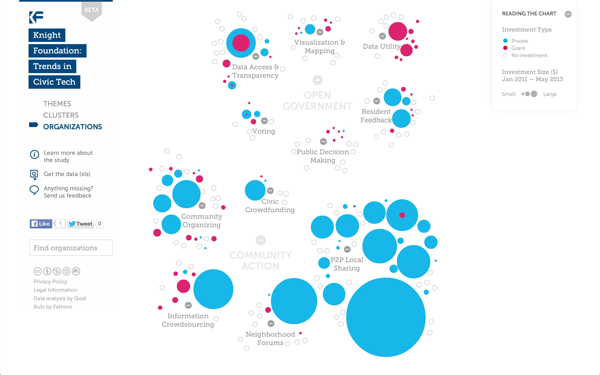The Knight Foundation has published a new report that maps the state of “civic tech”, a catchall term that here encompasses everything from the election-education hub Project Vote Smart to the room-rental platform Airbnb. The field is, to be sure, growing — Knight, assisted by data analytics firm Quid, found that while there were just 34 civic tech-related firms and non-profits in 2004, by last year there were 121. As the civic tech universe expands and evolves, those involved are actively trying to figure out where the money to support it will come from.
A few findings jump out both from the report and an accompanying interactive map. For one, there is considerable clustering in civic tech. Organizations in the field tend to fall within one of a handful of buckets, among them “Community Organizing” (petition site Change.org, for example), “Information Crowdsourcing” (traffic app Waze), “Data Access and Transparency” (data display platform Socrata), “Peer-to-Peer Sharing” (shared-ride company Lyft) and “Neighborhood Forums” (neighborhood-based social network Nextdoor).
Funders cluster, too. Between January 2011 and May 2013, the Omidyar Network, co-founded by Pierre Omidyar of eBay fame, made 16 civic tech investments, more than double the number made by the next most-active financial investor. Knight itself made 43 investments, more than seven times the number made by the next most-active foundation investor. There’s less concentration among individual investors, but there is Ashton Kutcher. The That ’70s Show actor clocked in with three investments: Peer-to-peer car rental company Getaround, the now-shuttered social dining site GrubWithUs, and Votizen, now part of Causes.com.
While more grants than private investments were made during the period — 101 compared to 76 — private investors contributed five dollars for every dollar given by a foundation. Over the course of the studied 2.5-year period, the total amount invested in “civic tech” companies and non-profits topped $431 million.
That said, a full $119 million of that amount went into the coffers of Airbnb, which isn’t exactly what springs to mind as a typical civic tech company. Indeed, about a third of the companies that Knight includes in its study are tagged as peer-to-peer firms. Which raises the question, what’s so “civic” about an Airbnb? For that matter, why is Lyft in here and not, say, Uber?
Knight’s researchers admit that they’ve gotten those questions a lot.
“There isn’t a common definition of civic tech,” says Jon Sotsky, director of strategy and assessment at the Knight Foundation. So the researchers began by seeding the study with a few groups and companies that they considered core to the field. From there they used media mentions and investment data to build out a map of related organizations. Adds Mayur Patel, vice president for strategy and assessment at Knight, ““we tried to make a distinction between resident-driven peer-to-peer, where the good that’s shared is owned by an individual, as opposed to instances where it is owned by a corporation or a company.” ” Early on they entertained the idea of a more restricted definition, but came to realize that Airbnb and Nextdoor are part of the same public conversation. How so? “You describe yourselves in similar ways,” says Patel, “and the kind of tech platforms that you use have similar capabilities.”
The resulting blurred lines and messiness, Sotsky and Patel argue, can actually work to the benefit of social-justice types, who must compete with well-oiled tech firms for investment dollars.
By “broadening the aperture,” Patel says, “what we’re trying to show is that, take community organizing, there are market opportunities in that. These are becoming areas of innovation that aren’t just about do-gooders working in non-profits.” And if, the thinking goes, Airbnb’s role in Hurricane Sandy housing adds weight to the idea that the modern firm can be both a business and a social enterprise, that helps foster useful “co-investment,” where a venture capitalist and a traditional foundation can contribute to the same project. “Very rarely,” he says, “do we see in the social sector the ability to map non-profit funding and private sector capital onto the same network.” It is, he says, “a little bit of an emerging frontier,” especially as government — and heavily regulated sectors like energy, education and health care — “become the next big frontier for disruption.”
The Knight researchers fully realize that some will take issue with such an expansive, market-driven definition of civic tech. (“It’s not exhaustive,” Patel says.) But they’ve provided the raw data so you can do your own analysis. In fact, they’d very much like that you do just that. The underlying ambition of the report, Patel says, is to “bring data analysis and data tools to the social sector.” That is, he says, “fundamental to being able to allocate capital efficiently.”
(Disclosure: The Knight Foundation provides funding for the Shared City column but has no editorial relationship with its contents.)

Nancy Scola is a Washington, DC-based journalist whose work tends to focus on the intersections of technology, politics, and public policy. Shortly after returning from Havana she started as a tech reporter at POLITICO.
















